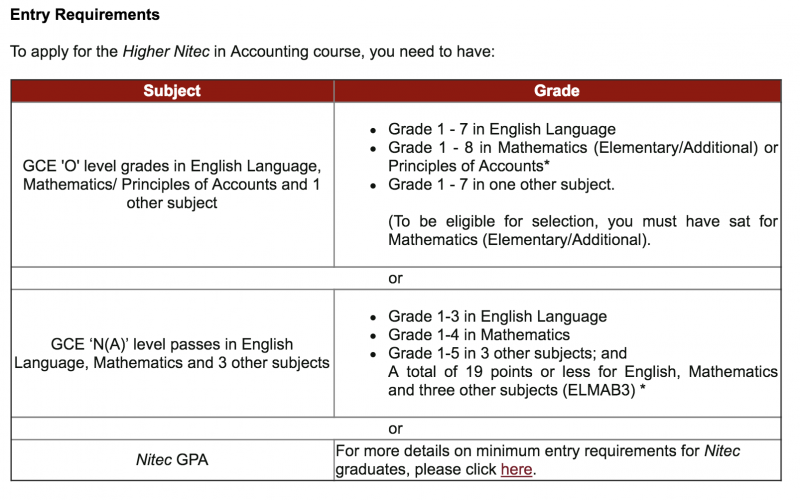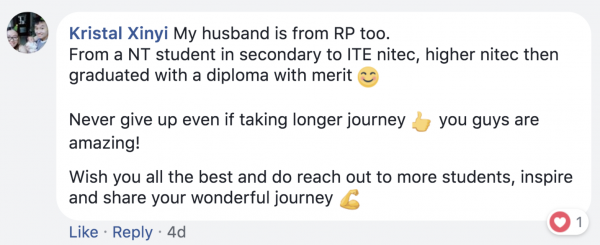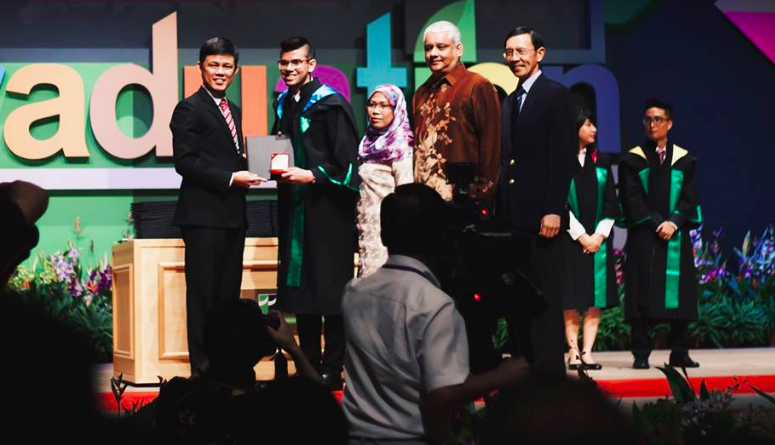Muhammad Imran is an undergrad at Nanyang Technological University majoring in Maritime Studies.
Unlike his peers, however, Imran will be 30 years old when he graduates — about five to seven years older than the average undergrad.
In a Facebook post on April 20, Imran shares the tedious but inspiring journey he took in academics, starting from N and O-Levels and the years to getting a degree — his parents' wish for him.
34 points for L1R5
Imran started out as a student in Hillgrove Secondary school, where he took his N-Levels before sitting for O-Levels.
Unfortunately, he didn't do very well, getting 26 points for his L1R4 (polytechnic/ITE admission scores) and 34 points for his L1R5 (junior college/Millennia Institute admission scores).
Here's a quick rundown of how the scoring system works:
The cut-off point for JCs is 20 and below, with more prestigious schools raking in single-digit-score students.
The path for O-Level and N-Level graduates who wish to apply for a National ITE certificate (Nitec) is slightly more complicated.
For example, the Nitec course in Security Technology only requires that you have completed either your N-Levels or O-Levels, albeit with the caveat that you must not have a colour-appreciation deficiency condition.
This means that your actual grades are not a factor.
 Screen shot via ITE.edu.sg.
Screen shot via ITE.edu.sg.
Those students applying for the Higher National ITE certificate (Higher Nitec), in addition to having completed their N-Levels or O-Levels, also have to meet certain pre-requisites depending on each individual course.
For example, a Higher Nitec course in Accounting requires a Grade of at least 1 to 7 in English, a Grade of 1 to 8 in Mathematics (Elementary/Additional) or Principles of Accounts, and a Grade of 1 to 7 in one other subject.
 Screen shot via ITE.edu.sg.
Screen shot via ITE.edu.sg.
Admission to a polytechnic falls along similar lines, with requirements depending on the specific course and institution.
Students from an N-Level, O-Level, A-Level or Nitec/Higher Nitec background can apply to study a particular course, with differing entry requirements for each of them.
For example, a student with a Nitec background who wishes to apply for an Aerospace Engineering course must obtain a minimum GPA of 3.5 (out of 4.0) in a relevant Nitec course, such as Architectural Drafting / Building Drafting (Architectural).
 Screen shot via Republic Poly.
Screen shot via Republic Poly.
Imran admits that he was definitely "one of the worst students in Hillgrove Secondary School", but he managed to get into a Higher Nitec course with his grades.
Graduated ITE with 2.6 GPA
Next, he attended ITE Clementi under Higher Nitec in Business IT, and graduated with a GPA of 2.6, out of a maximum of 4.0.
He then applied to polytechnics through the Joint Polytechnic Admissions Exercise (JPAE), but was rejected. While entry requirements depend on the individual courses, the minimum GPA for someone coming from Higher Nitec is a 2.0 to 3.0.
Undeterred, Imran went for National Service and applied through JPAE again. This time, he was accepted to Republic Polytechnic for a Diploma in Industrial and Operations Management.
[related_story]
Winning the Lee Kuan Yew Award
Imran then went on to graduate from Republic Polytechnic with a GPA of 3.94 out of a maximum of 4.0, meaning he scored mostly As throughout his time there.
He is also a recipient of the Lee Kuan Yew Award for Mathematics and Science, a prestigious accolade given out at the secondary, pre-university and polytechnic level that recognises the top performers in the fields of mathematics and science across the country.
So impressive this achievement is that, up till 1999, only the single top performer in a technology or computer course at each polytechnic would attain it.
And certainly, Imran describes his poly years as a "turning point of [his] life".
Subsequently, he received three offers from two local universities:
- Project Management, NUS
- Mechanical Engineering, NUS
- Maritime Studies, NTU
He eventually chose Maritime Studies in NTU.
Hard road
As Imran put it, his education journey has seen him take every possible examination in Singapore's education system, except for the A Levels.
He wrote that if he was given the choice to make his journey shorter, he said he would, of course, have done so.
“But when I ask them -- 'If given a path with no choices because you’re always doing badly in academics, would you go through my journey?'
Not many could give me a direct answer. Simply said, saying YES wasn’t easy for them.”
Inspiring others
Many Facebook users — some of whom are friends of Imran's — also left positive, encouraging comments:
 Screen shot from Muhammad Imran's Facebook page.
Screen shot from Muhammad Imran's Facebook page.
 Screen shot from Muhammad Imran's Facebook page.
Screen shot from Muhammad Imran's Facebook page.
He's inspired others to share their own stories as well:
 Screen shot from Muhammad Imran's Facebook page.
Screen shot from Muhammad Imran's Facebook page.
 Screen shot from Muhammad Imran's Facebook page.
Screen shot from Muhammad Imran's Facebook page.
While academic success isn't everything, Imran's story still teaches us the value of tenacity and resilience.
You can read his full post here:
Top image from Muhammad Imran's Facebook page.
If you like what you read, follow us on Facebook, Instagram, Twitter and Telegram to get the latest updates.
